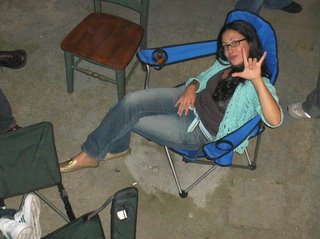
Power changes people, simply because it challenges them. Look at low- and high-technology adaptive devices for example and how when these products do not work, people are at a loss of information. OASID Director Richard Keller speaks to this topic in his online interview, about how people need to be comfortable with technology and be able to use it effectively. While Adaptive Technology can simply be seen as changing the environment so that a person can interact with it in a different way, I feel that it also inherently changes the person.
It happened to me on the subway today... my hearing aid battery died. As the sounds of Spanish-speaking New Yorkers, deep-throated business people and high-pitched highschoolers faded away, I began realized how much I relied on battery power and how much people can change when their normal functioning level decreases without consent. I tend to become less extroverted, less calm and less comfortable without the normal hearing level that my digital hearing aid affords.
Last night's 'Breezy' meeting was a glimpse into what people with disabilities deal with on a daily basis. When we are put into the hands of technology, where we are not able to hear on command, or see who is speaking to us, we are compelled to act as our own self-advocate. Just as participants last night let others know when they could/could not see or hear the host it was an example of what someone with a disability has to do for themselves on a daily basis.What might that mean for a person with a disability, if he or she were able to have access in the same kind of way that we did last night.
I am interested in finding out how someone who is completely deaf would react to the Breeze meeting because there was plenty of speaking, and without the host knowing sign language to sign into the camera (which was quite delayed) how would a deaf person read lips or get a comprehensive message. Also how would they respond if they saw that no transcript was automatically available for the online interview.
Perhaps these are the kinds of options that we should make available to our peers, students and colleagues so that the feelings of uncomfort and embarrassment can be avoided from the beginning.


1 Comments:
In general, websites that are accessible and easy to read for screenreaders can be useful learning tools for students. Why not learn about economics and sales from websites that you are familiar with. I just said BR as an example, but whatever your interests or hobbies may be, the website may be useful ways for students to understand relative topics (ie. money, markets, etc...)
Post a Comment
<< Home